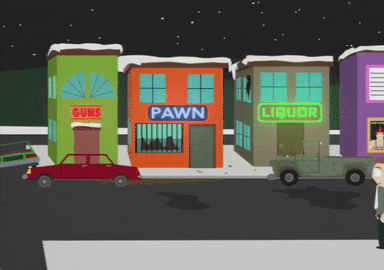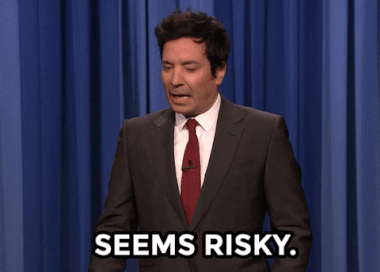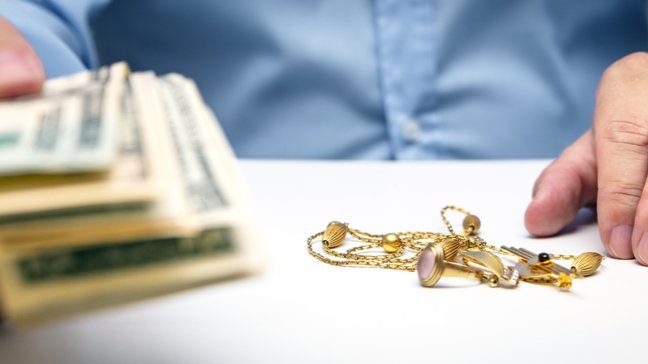Every once in a while, you may find yourself in need of a few extra bucks — and fast.
To help you get by, you may consider taking out a personal loan or even selling goods on Craigslist and eBay. You can consider pawn shop loans somewhat like a middle ground to these two options, offering you the chance to get your hands on extra cash, but without losing your possessions.
However, while pawn shop loans may be a preferable alternative to predatory payday loans, they too have pros and cons. Read on to learn how pawn shop loans work, reasons to consider them (and reasons to steer clear), alternatives, and more.
What’s Ahead:
Pros & cons of pawn shop loans
Like any sort of loan option out there, pawn shop loans come with their own pros and cons, and you should consider both before getting one.
Pros:
- You can get access to cash fast
- No credit check required
- Loan terms are regulated by federal and state laws
Cons:
- You could lose your belongings if you don’t pay back the loan within the set time
- Financing rates are much higher than traditional loans
- There are some sketchy pawn shops out there, so you need to do your research
How does a pawn shop loan work?
Pawn shop loans are a type of short-term, secured loan, which means you receive cash in exchange for some form of collateral. What you use as collateral, however, can take a number of forms.

Source: Giphy.com
You could exchange electronics or collectibles, or perhaps an instrument or antique; but in the grand scheme of things, what you use as collateral matters little so long as you pay the loan back on time and with interest.
Read more: Unsecured vs. secured loans: What’s the difference?
Generally, pawnbrokers offer 25% to 60% of the item’s value, and you’ll have just 30 days, or a few months at the most, to repay the loan and get your item back.
These loans are available for relatively small amounts of cash, so it shouldn’t be too difficult to make back the money. In fact, according to the National Pawnbrokers Association (NPA), the average pawn shop loan is just $150.
However, if you struggle to recover the amount you borrowed, you also have a second option: to not pay back the loan. Instead of paying the pawnbroker in interest, the item you used as collateral can act as your payment for the loan.
Are pawn shops a legit place to get a loan?
Movies and TV shows have made pawn shops look shady and suspicious; but as with many things portrayed on the big screen, this is far from reality. In fact, pawn shops, pawnbrokers, and pawn transactions are highly regulated.
On the federal level, pawn shops and transactions are covered by 15 statutes and regulations, which help protect consumers and ensure fair business practices, among other things. Pawn shops are also governed by certain state and local laws, managing details like interest rates, loan durations, and record-keeping. Finally, pawnbrokers are licensed by state and local governments, which evaluate and ensure they remain compliant with relevant laws.
Who should consider a pawn shop loan?

Source: Giphy.com
- People who have poor or no credit (although there are other, better options)
- People who need cash fast (again, there are other ways)
- People who only need a small amount of money
- People who aren’t worried about losing the collateral forever
For the vast majority of people who take out a pawn shop loan, all goes as planned. According to the NPA, the average U.S. redemption rate for pawn shop loans is 85%.
Of course, that means the other 15% do default and lose their collateral, so you should only consider a pawn shop loan if you’re not too worried about saying goodbye to that item for good.
With this said, pawn shop loans can be an option for people with a poor or limited financial history because, unlike other traditional lenders, pawnbrokers don’t need to check your credit or income to loan you money. In fact, most pawnbrokers just need a valid government ID. As a result, if you are unable to repay the loan, or choose not to, your credit score will remain unscathed.
Read more: How credit works: Understand the credit history reporting system
If you decide to take your property to a local pawn shop, it’s always good to make sure they’re an NPA member store first.
Who shouldn’t consider a pawn shop loan?

Source: Giphy.com
- Pretty much everyone, unless you can’t get a loan any other way
Whether you pay back your loan or not, the costs associated with pawn shop loans are their biggest drawback.
The interest rates for pawn shop loans are typically around 20% to 25% per month; personal loans, on the other hand, can offer the same rates annually, making pawn shops a particularly expensive means of finding quick cash. For example, it may cost $25 just to borrow $100 for 30 days. That’s a pretty steep fee as is, but some pawn shops charge additional fees, for storage and such, which can hike up the price even further.
However, as mentioned previously, states determine the interest rates pawn shops can charge, so fees vary nationwide. In Nevada, for instance, pawn shops can charge no more than 13% interest per month, and in Ohio, interest rates are half that, at just 6% per month.
Another issue to consider is many people attempt to use pawn shop loans as more than a short-term solution. Many borrowers become repeat customers, but we only have so much property available to sell.
If you suspect you’re going to need to borrow money repeatedly, you should consider long-term alternatives like a line of credit. That way, you don’t risk losing your belongings, and can also boost your credit history for future transactions.
Read more: Best personal lines of credit
Alternatives to pawn shop loans
Pawn shop loans aren’t always bad, but for most people, they should really be a last resort.
Fortunately, there are plenty of other ways to make some extra money that don’t chance losing family heirlooms and prized possessions. Take a look at the list below for four popular alternatives to pawn shop loans.
1. Payday alternative loans (PALs)
Like pawn shop loans, payday alternative loans (PALs) are both short-term and small-dollar.
You can typically find $200 to $1,000 PALs for terms ranging from one to six months, and the interest rates are capped at 28%. Or, if you need a little more money and a little more time, PALs II (a second type of payday alternative loan introduced by the National Credit Union Administration in 2019) are available for up to $2,000, spanning one-year terms.
PALs I and PALs II are only available for federal credit union members (or those who’ve been a member for at least a month).
Read more: Best credit unions
2. Personal loans
Personal loans are a bit more complicated to acquire, but the long-term savings make the extra work worthwhile.
With personal loans, you can get a lot more cash, and you’ll have more time to pay it back. In addition, you won’t have to put any collateral on the line to get the money. However, traditional lenders will consider your credit history to determine whether or not you qualify.
Read more: Best personal loans for poor credit
While it’s certainly plausible to find a more attractive interest rate with a personal loan, the rates do vary considerably.
A good option is to start your search on a site like Monevo. Monevo shops over 30 lenders for you, all in one place, in a matter of seconds. It won’t affect your credit score, and you can secure rates between 1.99% - 35.99% APR.
Fiona is another popular aggregator to consider. Like Monevo, Fiona collects information from top lenders, so you can review quotes all in one convenient location. Quotes are also personalized based on your unique needs and financial history, so you can confidently compare offers and select the one that best meets your goals. To see your own rate specifically in your area, you can also check out the table below:
There’s also a growing number of lenders out there that don’t require credit checks. Instead, they look at things like rent payments, cash flow, and employment history to assess your lending risk.
These alternative data lenders are specifically aimed at people with poor credit, or who have no credit history at all, and could be a good alternative to pawn shop loans.
Read more: Best no-credit-check loans that use alternative credit data
3. Peer-to-peer loans
Peer-to-peer (P2P) lending is when a borrower gets a loan directly from individual investors rather than an institution like a bank or credit union.
These loans typically aren’t as strict as banks or credit unions, which makes it easier to secure a loan with decent terms, even if you have poor credit history.
They also tend to be much faster and the whole process can be done entirely online.
Read more: Best peer-to-peer lending sites for borrowers and investors
4. Credit cards
Pawn shop loans are generally for small-dollar amounts and offer short repayment terms, but a credit card can get the same job done while providing an opportunity for you to build credit, too.
While credit cards still charge high interest, if you can pay off the balance before the due date, you can avoid paying that interest altogether.
If you’re not sure you’ll be able to pay off the amount you need by the end of the month, then a 0% APR credit card may be a good option. With these cards, you’ll be charged no interest on any purchases or any balance carried, for a set period of time (typically 12 to 21 months from when you first open the account).
Read more: Best 0% APR credit cards
Or, you could make use of a cash back credit card, so you can earn some money back on whatever you need the loan amount for (however, you’ll want to be sure you can pay the balance off quickly — otherwise you could easily end up paying far more in interest than you earned back).
Read more: Best cash back credit cards
Summary
Pawn shop loans can provide an attractive solution for individuals with poor credit who need nothing more than a short-term, small-dollar loan; however, for most people, the benefits of bypassing credit requirements and getting cash quickly are minuscule next to the interest rates alone.
In many states, interest fees reach up to 25%, not to mention the added costs for storage and such. Of course, on top of these steep fees, borrowers risk losing precious property, from antique family heirlooms to expensive electronics.
Before you stroll down the street to your local pawn shop, consider alternatives like personal loans or credit cards.


